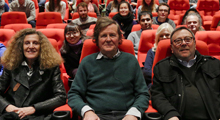
Sir David Hare delivered an inspiring and memorable masterclass to the students in conversation with NFTS Head of Short Courses, Peter Ansorge, focussing on the art of screenwriting.
The double Oscar nominated and BAFTA winning director and playwright, Sir David Hare’s work encompasses theatre, film & TV. His screenplays for The Hours and The Reader were both nominated for Oscars & BAFTAs; he won the Berlin Golden Bear for Wetherby and a BAFTA for his TV drama Licking Hitler, while his play, Skylight, won the Laurence Olivier Theatre Award. His latest film, Denial, Holocaust denial courtroom drama starring Rachel Weisz, will be released in January 2017 and his current play, The Red Barn is at the Lyttelton until January 2017.
David was accompanied by his wife, Nicole Farhi CBE, a fashion designer and sculptor, and actress, Sabine Haudepin, who is known for her role as Sabine, ‘la petite’ in Jules et Jim.

David set up the session by asking the audience to close their eyes and imagine a desert island, an islander and a boat and then project that vision onto the cinema screen. “Every one of you will have something different painted in your mind and this is the issue that a screenwriter has to deal with as there is the illusion that the film already exists. There is only one thing you have to bear in mind as a writer; the film does not exist but everyone involved with the film sees something different, which is why the screenwriter’s job is so difficult as everyone thinks they are imagining the same thing but they are not.”
David counselled the students to expect the initial reaction to a screenplay to be one of disappointment because the director or producer may have thought it would be something else. He explained that the screenwriter’s task is to “negotiate and expose what you think the film is to people so it reaches the screen in its best possible form.
According to David, the screenwriter often has to spend more time defending the script than writing it! However, he countered that “there is also often extremely valuable input from every section of the filmmaking process including some genius ideas that will make the film better than you could imagine.” With regards to advice, “you should follow this simple rule: Only take advice from someone who is committing their own integrity and name to what will be on screen. If someone has the courage to invest in something you have written, they have a right to try and influence it.”
On directors, David had the following to say: “Great directors are collaborators and open to suggestions from every department.” He gave the example of Stephen Daldry who invited him into the cutting room: “Screenwriters do the same thing as editors. We order the thoughts and feelings that the audience responds to and consider the movement of the film in the same way. Cinema is all about the way in which words are mixed with images.”
To illustrate this, David reminded the students of one of the most famous movie scenes of all time when character, Mr Bernstein recalls a girl in a white dress in Citizen Kane. This scene doesn’t require a flashback as the speech stimulates the audience’s imagination.
David continued on the power of words: “Language is one of the elements that can make a film memorable and exciting and something the audience can remember for the rest of their lives. It’s exhilarating how words and images come together.”
Screenwriters need to develop and hone the skill to get information across without the audience knowing. They do this by hiding information so that the audience picks things up without realising it. “The minute the audience becomes aware that information is being pushed at them, you’ve lost the battle.”
Plausibility is also a vital issue to resolve. “In literature, things are often so well written, it never occurs to the reader how unlikely the storyline was. In cinema, you have to confront that implausibility as the audience knows that the film is cheating as you decide to show some things and not others. The audience either accepts or rejects the cut.” When writing the screenplay for Damage, David went through a rigorous process with director, Louis Malle whereby Louis constantly asked David to tell him the story of the film and answer any plausibility issues. “Whilst this was a really painful process, it was incredibly valuable as once you understand the structure and there are no questions that can’t be answered, the plot becomes impermeable.”
According to David, the reason why long form TV series are so popular at the moment is because the audience isn’t familiar with the format. Turning to the students, David said: “You need to come up with new formulas to add anything to the art of screenwriting and I expect you all to be doing this in future!”
If you would like to come along to masterclasses like this, we have a number of courses with places available to start in January 2017. These include a Diploma in Graphics & Titles for Film & Television, Cameras, Sound and Vision Mixing for Television Production, a Masters in Digital Effects, Film Studies, Programming and Curation and Marketing for Film, TV and Games.
